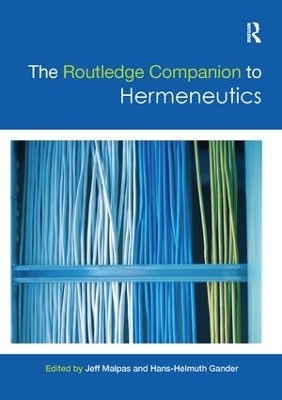
The Routledge Companion to Hermeneutics
Routledge (Verlag)
978-1-138-57463-2 (ISBN)
Comprising over fifty chapters by a team of international contributors the Companion is divided into five parts:
main figures in the hermeneutical tradition movement, including Heidegger, Gadamer and Ricoeur
main topics in hermeneutics such as language, truth, relativism and history
the engagement of hermeneutics with central disciplines such as literature, religion, race and gender, and art
hermeneutics and world philosophies including Asian, Islamic and Judaic thought
hermeneutic challenges and debates, such as critical theory, structuralism and phenomenology.
Jeff Malpas is Professor of Philosophy at the University of Tasmania, Australia. Hans-Helmuth Gander is a Professor of Philosophy at Albert-Ludwigs-Universität Freiburg, Germany
Chapter 1 Introduction: Hermeneutics and Philosophy, Jeff Malpas; Part I Hermeneutic Origins; Chapter 1a Hermeneutics in Greek Philosophy, Francisco Gonzalez; Chapter 2 Hermeneutics in Medieval Thought, Mauricio Beuchot, Juan Tubert-Oklander; Part II Hermeneutic Thinkers; Chapter 3 Spinoza and Vico: a New Science of Interpretation, Leonardo Amoroso, Aidan Butler; Chapter 4 Wolff, Chladenius, Meier: Enlightenment and Hermeneutics, Frederick Beiser; Chapter 5 Ast and Schleiermacher: Hermeneutics and Critical Philosophy, Gunter Scholtz; Chapter 6 Dilthey: Hermeneutics and Neo-Kantianism, Rudolf A. Makkreel; Chapter 7 Nietzsche and the Ubiquity of Hermeneutics, Babette Babich; Chapter 8 Barth and Bultmann: Theological Hermeneutics, John E. Wilson; Chapter 9 Heidegger: Transformation of Hermeneutics, Ingo Farin; Chapter 10 Strauss: Hermeneutics or Esotericism?, Catherine H. Zuckert, Michael Zuckert; Chapter 11 Gadamer: the Universality of Hermeneutics, Hans-Helmuth Gander; Chapter 12 Ricoeur: The Long Way of Hermeneutics, Jean Grondin; Chapter 13 Lonergan's Hermeneutics, Frederick G. Lawrence; Chapter 14 Pareyson and Vattimo: from Truth to Nihilism, Gaetano Chiurazzi; Chapter 15 Collingwood and Oakeshott: History and Idealism, Giuseppina D’Oro; Chapter 16 Macintyre and Taylor: Traditions, Rationality, and Modernity, Arto Laitinen; Chapter 17 Davidson and Rorty: Triangulation and Anti-Foundationalism, Bjørn Torgrim Ramberg; Chapter 18 Brandom and Mcdowell: Hermeneutics and Normativity, Glenda Satne; Part III Hermeneutic Questions; Chapter 19 Rationality and Method, Ambrosio Velasco Gómez; Chapter 20 Being and Metaphysics, Santiago Zabala; Chapter 21 Language and Meaning, Daniel Dahlstrom; Chapter 22 Truth and Relativism, Paul Healy; Chapter 23 History and Historicity, Kristin Gjesdal; Chapter 24 Ethics and Community, Hans-Herbert Kögler; Chapter 25 Politics and Critique, Michael Marder; Chapter 26 Dialogue and Conversation, James Risser; Chapter 27 Text and Translation, Dennis J. Schmidt; Chapter 28 Place and Situation, Jeff Malpas; Chapter 29 Symbol and Allegory, William Franke; Chapter 30 Life and World, Eric S. Nelson; Chapter 31 Nature and Environment, Brian Treanor; Chapter 32 Self and Narrative, Shaun Gallagher; Part IV Hermeneutic Engagements; Chapter 33 Hermeneutics, Epistemology, and Science, Fred D'Agostino; Chapter 34 Hermeneutics and Literature, Andrew Bowie; Chapter 35 Hermeneutics, Religion, and God, Jean Greisch; Chapter 36 Hermeneutics, Jurisprudence and Law, Ralf Poscher; Chapter 37 Hermeneutics and Rhetoric, John Arthos; Chapter 38 Hermeneutics and Intercultural Understanding, Bruce Janz; Chapter 39 Hermeneutics and the Social Sciences, William Outhwaite; Chapter 40 Hermeneutics, Race and Gender, Tina Fernandes Botts; Chapter 41 Hermeneutics, Aesthetics and the Arts, Beata Sirowy; Chapter 42 Hermeneutics and Education, Paul Fairfield; Chapter 43 Hermeneutics, Health and Medicine, Fredrik Svenaeus; Chapter 44 Hermeneutics, Architecture and Design, Richard Coyne; Part V Hermeneutic Challenges and Dialogues; Chapter 45 Hermeneutics and Phenomenology, Robert Dostal; Chapter 46 Hermeneutics and Deconstruction, Donatella Di Cesare; Chapter 47 Hermeneutics and Critical Theory, Nicholas H. Smith; Chapter 48 Hermeneutics and Pragmatism, Endre Begby; Chapter 49 Hermeneutics and Psychoanalysis, Philippe Cabestan; Chapter 50 Hermeneutics and Language Philosophy, Lee Braver; Chapter 51 Hermeneutics and Feminism, Georgia Warnke; Chapter 52 Hermeneutics, Structuralism and Post-Structuralism, Nicholas Davey; Chapter 53 Hermeneutics and Confucianism, Kathleen Wright; Chapter 54 Hermeneutics and Judaic Thought, Andrew Benjamin; Chapter 55 Arabic and Islamic Hermeneutics, Ebrahim Moosa; Chapter 57 Conclusion: The Future of Hermeneutics, Gianni Vattimo, Faustino Fraisopi;
| Erscheinungsdatum | 23.09.2017 |
|---|---|
| Reihe/Serie | Routledge Philosophy Companions |
| Verlagsort | London |
| Sprache | englisch |
| Maße | 174 x 246 mm |
| Gewicht | 1247 g |
| Themenwelt | Geisteswissenschaften ► Philosophie ► Erkenntnistheorie / Wissenschaftstheorie |
| Geisteswissenschaften ► Philosophie ► Philosophie der Neuzeit | |
| Geisteswissenschaften ► Religion / Theologie | |
| Geisteswissenschaften ► Sprach- / Literaturwissenschaft ► Anglistik / Amerikanistik | |
| Geisteswissenschaften ► Sprach- / Literaturwissenschaft ► Literaturwissenschaft | |
| Sozialwissenschaften ► Soziologie | |
| ISBN-10 | 1-138-57463-5 / 1138574635 |
| ISBN-13 | 978-1-138-57463-2 / 9781138574632 |
| Zustand | Neuware |
| Informationen gemäß Produktsicherheitsverordnung (GPSR) | |
| Haben Sie eine Frage zum Produkt? |
aus dem Bereich

![Was heißt Denken?. Vorlesung Wintersemester 1951/52. [Was bedeutet das alles?] - Martin Heidegger](/media/113619842)
